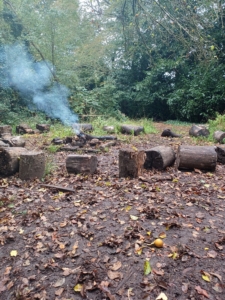

Free resources and a backdrop that’s forever changing. Matt Harder writes about why he loves Forest School and the benefits it has on his pupils.

So, imagine you were offered a learning environment where the displays re-decorated themselves daily and where the manipulative resources were widely available and, best of all, totally free.
Also imagine that in this environment, the children could gain skills in English, Maths, Science, Design & Food Technologies, Art and PE, as well as a whole range of other life skills, without someone having to print out lots of worksheets, or prepare interactive whiteboard presentations.
“It doesn’t exist,” I hear someone cry.
But yes, it does.
If you’re in mainstream education, and haven’t been looking for glue sticks in the store cupboard for the last ten years, you will probably have heard of the term “Forest School”.
But what is Forest School? And where is it? And why is it important?
(And why so many conjunctions at the start of the sentences?)
Forest School is nothing more or less complicated than a pedagogical ethos, similar to Montessori, Reggio Emilio or other approaches. It is defined by six principles: In a soundbite, Forest School is a long-term, child-led approach, run by trained Forest School professionals, based in any natural environment, which encourages risk-taking and allows for holistic learning.
As long as the servers aren’t down, you can find these principles in detail on the Forest School Association website.
Child-led is the key here. I’ve been facilitating Forest School sessions for over ten years, and I am still on my first six weeks planning, as the many tangential learning opportunities always lead down interesting and complex paths of innovation. That’s the joy of Forest School, where the inspiration comes from unexpected occurrences and random trains of thought in the learners. Guided by open questioning, these can lead to moments of incredible discovery and learning. And how great that their craft resources and practical apparatus literally grow on trees…
The last time my school was inspected, I had a brief and rather intimidating conversation with the inspector. It went something along these lines…
Inspector: You are responsible for planning Forest School Sessions across the school?
Me: In a manner of speaking.
Inspector: So what will the children be learning this afternoon?
Me: I don’t know. I’ll find out when I’m out there…
Despite offering a spare pair of wellies, the inspector politely declined to join us in the mud, but she did ask the children about Forest School, and their replies really said it all. One of their favourite memories was filtering pond water through my socks to make it drinkable.
Before anyone reports me to Health and Safety, the “pond water” was an appetizing mix of extremely watery & milky coffee, with the contents of a tea bag emptied into it for texture, and the socks were not the only thing they used to filter it. This was an entirely child-initiated activity, which stemmed from a conversation about the water being muddy in our pond. The science objectives which we sieved (analogy intended) from the activity were numerous, the learning concrete. Ok, so the resources for this weren’t free as such (quietly liberated from the staffroom) but most of the items used in our sessions are.
This memory and the learning which came from it was quoted in great detail to the inspector, and came from a SEND child in Year 4, who was working at least 3 years below age expectations within the classroom. A Forest School environment can be a great levelling experience, especially for those who struggle within a classroom setting.
Forest School has been gaining notoriety in recent years, increasingly more rapid since last year, and for a fairly obvious reason. When “bubbles” are popping left right and centre, the benefits of learning in fresh air are becoming widely noticed, if not necessary. From a scientific viewpoint, higher oxygen levels are better for brain function, hence the need for those promptly delivered CO2 monitors for schools…
Not only this, but we’re in the midst of the highest youth engagement in Climate Activism that has ever been. This is the time when Forest School, with its potential to build strong nature-connection, is an integral opportunity to help learners understand what may have been under-represented in the past.
I could go on for pages with anecdotes of incredible learning, personal development and behavioural change which I have seen during my time as a Forest School leader. I could extol the increased empathy in children, which has been directly linked to nature-connection. I could talk about the massive benefits of play-based-learning, or risk-taking, resilience, emotional intelligence, wellbeing…
So, imagine you were offered an outdoor learning environment where the trees re-decorated themselves throughout the seasons, and where every day, there was a new and totally unique pattern on a spider’s web.
Where the counting, building and art resources were widely available and totally free.
Imagine this environment would provide countless opportunities for discovery, play, skill growth and personality development. Resilience, imagination, creativity, understanding, connection.
“It doesn’t exist,” I hear someone cry.
Declarations
I am on the board of directors for the Forest School Association, but these views above are my own and not representative of the FSA.
Photo Credits to Matt Harder.